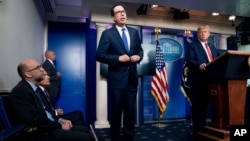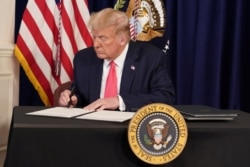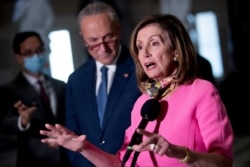The White House signaled Monday it is open to more negotiations with opposition Democrats on a coronavirus aid package and willing to spend more money to reach a deal.
“We’re prepared to put more money on the table,” Treasury Secretary Steven Mnuchin told CNBC. “The president is determined to spend what we need to spend.”
President Donald Trump signed executive orders Saturday extending a portion of the expired benefits to millions of unemployed workers and deferring payroll taxes for many employed Americans. In a new Twitter comment, he did not rule out more negotiations but blamed Senate Democratic leader Chuck Schumer and House Speaker Nancy Pelosi for Friday’s collapse of talks on an aid package.
“So now Schumer and Pelosi want to meet to make a deal,” Trump tweeted. “Amazing how it all works, isn’t it. Where have they been for the last 4 weeks when they were “hardliners”, and only wanted BAILOUT MONEY for Democrat run states and cities that are failing badly? They know my phone number!”
So now Schumer and Pelosi want to meet to make a deal. Amazing how it all works, isn’t it. Where have they been for the last 4 weeks when they were “hardliners”, and only wanted BAILOUT MONEY for Democrat run states and cities that are failing badly? They know my phone number!
— Donald J. Trump (@realDonaldTrump) August 10, 2020
Speaking Monday to MSNBC, Pelosi called Trump’s orders “an illusion,” and said his efforts are not aimed at helping people, but rather boosting the stock market.
“It shouldn’t be partisan that we would feed our children,” Pelosi said. “It shouldn’t be partisan that we not allow people to be evicted because they’re caught up in a pandemic.”
As the talks collapsed last week, Schumer and Pelosi said Democrats were willing to cut $1 trillion from their original demand for White House approval of the $3.4 trillion coronavirus aid package approved by the Democrat-controlled House of Representatives in mid-May. They said the White House should at the same time double its call for a $1 trillion deal to at least $2 trillion, but the Trump administration refused.
The Treasury chief said the Trump administration is willing to spend more money, but not “unlimited amounts of money that don’t make sense.”
Mnuchin said the two sides have “agreed on more money for businesses that are particularly hard hit,” sending another $1,200 check economic stimulus check to most adult Americans, providing more aid to schools so they can reopen safely and more money for hospitals and the development of vaccines to combat the coronavirus.
But one key sticking point in the coronavirus talks is additional aid to state and local governments, the assistance Trump disparaged as “bailout money” for jurisdictions run by opposition Democrats. Pelosi and Schumer say the hard-pressed state and local governments need $1 trillion.
“We’ve offered more money for state and local [governments],” Mnuchin said, “but we’re not going to give a trillion.... That’s just not a reasonable approach.”
Mnuchin called for congressional passage of aid the two sides have agreed on while talks continue on disputed items, but the Democrats have balked at a piecemeal approach to an aid package.
Mnuchin declined to speculate when talks could resume.
With the collapse in the negotiations, Mnuchin said Trump “needed to take action,” the executive orders he signed at a golf resort he owns in Bedminster, New Jersey.
In Sunday talk show appearances, Schumer and Pelosi derided the provisions as too limited to help unemployed workers or other Americans impacted by the coronavirus. Pelosi also said Trump’s actions were unconstitutional since U.S. authority for spending legislation rests with Congress, not the president.
Democrats sought to extend the $600-a-week federal government boost to less generous state unemployment benefits through the end of 2020 after they expired at the end of July. Trump cut the figure to $400 and said states should pay $100 of that amount.
Schumer blamed Senate Republicans for failing to take action for months after the House passed its coronavirus relief legislation and said Trump’s orders to help the unemployed fall short of what is needed to help people.
“President Trump's executive order on unemployment benefits is put together in such a sloppy way that it'll take weeks or months for states to even implement. Millions could lose everything before they ever see a check,” Schumer tweeted Monday. “Republicans must get back to the negotiating table!”
The president also suspended the 7.65% payroll tax for workers who make less than $100,000 a year through the end of 2020. Unemployed workers, who do not pay the tax because they aren’t collecting a paycheck, won’t benefit. The taxes are used to fund pensions and health care for older Americans. The money would need to be paid back eventually unless Congress acts to write off the deferred taxes.
Trump also said he was extending protections for rental tenants threatened with eviction, further delaying student loan payments and maintaining zero percent interest on federally financed loans.
The spread of the pandemic remains unchecked in the U.S. with the country’s number of confirmed cases topping 5 million on Sunday and the death toll more than 163,000. Both figures are the biggest national totals across the globe.



